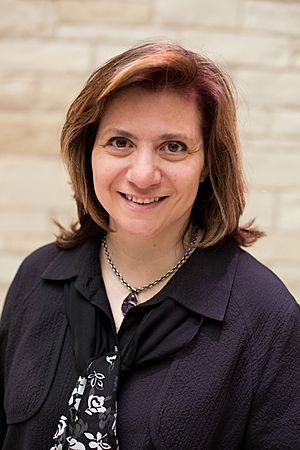Vicky Kalogera facts for kids
Quick facts for kids
Vicky Kalogera
|
|
|---|---|
| Vassiliki Kalogera | |
 |
|
| Born | 15 February 1971 (age 55) |
| Alma mater | University of Thessaloniki University of Illinois Urbana-Champaign |
| Spouse(s) | Frederic A. Rasio, Astrophysicist |
| Awards | National Academy of Sciences Fellow (2018) Dannie Heineman Prize for Astrophysics (2018) Hans A. Bethe Prize (2016) |
| Scientific career | |
| Fields | Gravitational waves |
| Institutions | Northwestern University |
| Thesis | Formation of low-mass x-ray binaries (1997) |
| Doctoral advisor | Ronald F. Webbink |
| Notes | |
|
Director of the Center for Interdisciplinary Exploration & Research in Astrophysics (CIERA) at Northwestern University
|
|
Vassiliki Kalogera is a Greek astrophysicist. She is a professor at Northwestern University and leads a special center there called CIERA. She is a very important scientist in the LIGO team. This team made a huge discovery in 2015 when they observed gravitational waves.
Vicky Kalogera is a top expert in understanding gravitational waves. She also studies how X-rays come from special pairs of stars called compact binary objects. Her work helps us learn about what happens when neutron stars crash into each other.
Contents
Early Life and School
Vicky Kalogera was born in 1971 in Serres, Greece. She loved science from a young age.
Getting Her Degrees
In 1992, she earned her first degree in physics from the University of Thessaloniki. She then moved to the University of Illinois Urbana-Champaign for her advanced studies. In 1997, she finished her PhD in astronomy.
Starting Her Career
After her PhD, she worked at the Center for Astrophysics | Harvard & Smithsonian. She joined Northwestern University in 2001. There, she became a professor in the Department of Physics and Astronomy.
Career and Research Discoveries
Professor Kalogera is a very important professor at Northwestern University. She is the director of CIERA. This center helps scientists explore and research space.
Studying Gravitational Waves
Her main research focuses on gravitational waves. These are ripples in space and time. They are caused by huge events like black holes crashing together. She helps develop models for these waves.
Understanding Star Systems
She also studies X-ray binaries. These are pairs of stars where one star pulls gas from the other. This gas then gives off X-rays. Her work helps predict what happens before a supernova, which is a giant star explosion. She also contributes to projects like the LSST.
Leadership in Physics
From 2022 to 2025, Professor Kalogera was the vice president of the board for the Aspen Center for Physics. This shows her leadership in the science community.
Awards and Honors
Vicky Kalogera has received many awards for her amazing work.
- 2020: Named a Legacy Fellow by the American Astronomical Society.
- 2020: Recognized as one of Crain's Chicago Business Notable Women in STEM.
- 2019: Elected Fellow of the American Association for the Advancement of Science.
- 2018: Became a Member of the US National Academy of Sciences.
- 2018: Won the Dannie Heineman Prize for Astrophysics. This award recognized her important work on how compact objects in space evolve. It also highlighted her studies on the signals they send out, like gravitational waves.
- 2017: Became a Senior Fellow for the CIFAR Gravity and the Extreme Universe Program.
- 2017: Received the Martin E. and Gertrude G. Walder Award for Research Excellence from Northwestern University.
- 2016: Awarded the Hans A. Bethe Prize. This prize honored her key contributions to understanding radiation from binary compact objects. She even predicted that neutron star mergers create short gamma-ray bursts.
- 2012: Named a Simons Foundation Fellow in Theoretical Astrophysics.
- 2009: Became a Kavli Fellow for the Kavli Frontiers of Science German-American Symposium.
- 2008: Became a Fellow of the American Physical Society. This was for her work on compact objects in binary systems.
- 2008: Received the Maria Goeppert-Mayer Award from the American Physical Society.
- 2008: Chosen as one of Astronomy Magazine's "10 Rising Stars of Astronomy."
- 2005: Received the National Science Foundation CAREER Award for her studies on compact objects.
- 2004: Won the Cottrell Scholar Award.
- 2002: Received the Annie Jump Cannon Award for her excellent research as a postdoctoral woman scientist.
- 2002: Awarded a Packard Fellowship for Science and Engineering.
 | Aaron Henry |
 | T. R. M. Howard |
 | Jesse Jackson |

